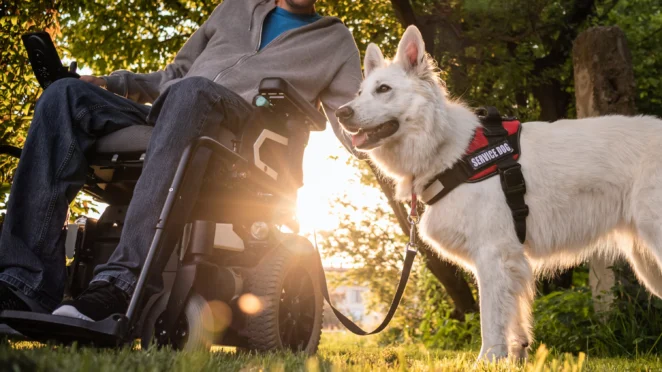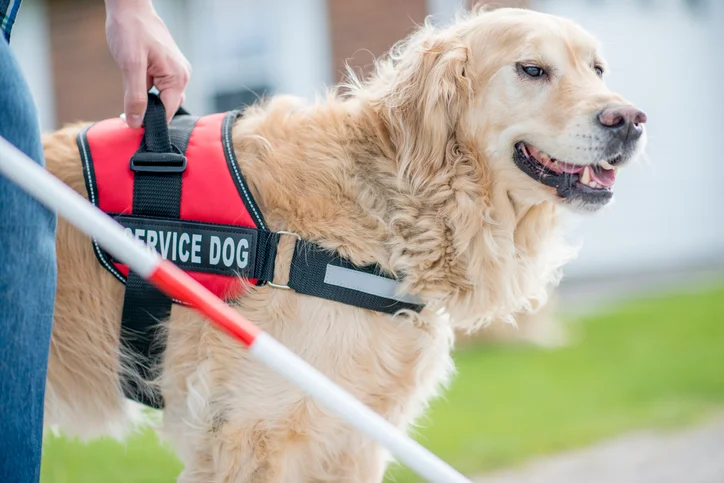Considering whether a service dog is the right fit for you and your family involves thoughtful contemplation. Have you taken the time to envision what life would be like with a service dog? While adopting any dog comes with considerable responsibility, the decision to bring a service dog into your life introduces additional obligations that require thorough preparation.
If you’re ready to invest the necessary effort, welcoming a service dog into your life in Maryland can bring numerous benefits. The state’s laws recognize and accommodate the presence of service animals in both residential and public environments. Moreover, these remarkable animals can be trained to perform a wide range of tasks that will assist you in navigating your disability effectively. Whether providing mobility support, alerting you to potential dangers, or offering comforting emotional support, a service dog can be an invaluable companion on your journey.
1. They may require certification:
Service animals have special privileges because they are working animals, not just accessories. One of these privileges is being allowed in places where regular pets are not allowed, like planes. However, it can be difficult for some businesses or organizations to let your service animal inside. That’s why it’s vital as a service dog owner to have your animal certified and registered.
Maryland state safeguards your right as an Emotional Support Animal (ESA) owner to travel and live with your faithful companion. An ESA letter grants individuals with mental health conditions additional rights and allows them to travel with their emotional support animal. The process of applying for your Maryland ESA letter can be straightforward, but it is essential to meet the requirements and comprehend the responsibilities. It’s critical to consult an authorized professional who can assess your needs and give the necessary documentation.
It can be helpful to have them wear a vest and carry an ID card to make things easier. While you don’t have to prove anything according to ADA rules, registering your dog can be valuable in different situations. Some cities might require registered service animals for public purposes.
2. They are more than just a pet:

A service dog is not just an ordinary pet; it is a specially trained companion that offers people with disabilities crucial support and assistance. These incredible dogs can carry out specific tasks that help their handlers overcome the challenges posed by their disabilities.
For instance, a service dog can help visually impaired people and become their trusted guide, providing them with the security and confidence to navigate their surroundings. These remarkable dogs serve as their eyes, skillfully leading them around obstacles and alerting them to potential dangers.
Similarly, individuals with mobility limitations can vastly benefit from the assistance of a service dog. Dogs can retrieve objects, open doors, and provide physical support for balance and stability while walking. Such tasks significantly enhance their independence and overall quality of life.
3. Service dogs are expensive:
Understanding the financial implications of getting a service dog is crucial because it is a significant commitment.
It is worth noting that service dogs come with several ongoing costs in addition to the upfront fee. Excluding unanticipated medical procedures or treatments, the average annual cost of caring for a service dog can be up to $2,000. It includes setting up regular vet visits to maintain your service dog’s health and ensure their general well-being. To properly budget for dog ownership, you must incorporate these costs.
When considering the purchase of a service animal, it is crucial to do comprehensive market research. Ensure that the animal’s trained abilities align with your specific needs. Additionally, verify that the seller possesses a valid license for training and selling before proceeding with the purchase.
4. Continuous training is necessary:

Ensuring your service dog remains skilled and well-trained is crucial. Keep your service animal in a professional environment, and don’t treat them like other pets. For example, if you’re used to giving your pet snacks from your plate, refrain from doing the same with your service dog. They may start taking their duties lightly and acting more like pets than working companions as a consequence.
In addition, setting clear boundaries and expectations with your service dog is vital. Consistency in enforcing rules and routines helps them maintain their training and professionalism. Remember, your service dog’s primary purpose is to assist and support you, so reinforcing their training reminds them of their role.
5. Service dog will not leave you alone:
Are you ready to have a dog constantly within a close range of two to six feet throughout its natural life? Service dogs need to remain near their handlers to work effectively. They will move alongside you, following you from one room to another, and may choose to rest under your desk or at your feet while you work or unwind.
You will always be physically or verbally connected to them when you go outside. Your service dog becomes more than just a working companion; they are your loyal partner, friend, helper, and teammate. They belong exclusively to you. You should carefully consider whether owning a service dog is the right decision if you value your personal space or enjoy an occasional respite from responsibilities.
6. People will ask you questions:

When encountering a service dog, people are often curious to learn more about them and their role. During errands or in public spaces, you may come across individuals who question the presence of a dog, asking things like, “Are you allowed to take your pet in here?” Be prepared for these situations as they can be challenging, affecting travel and time constraints.
Seeing a service dog is uncommon for many individuals, so expect inquiries and be ready to respond. If faced with multiple questions, kindly explain that you have many responsibilities and limited time to answer them. Remember, these individuals do not intend any harm to your dog, so treating them with respect and kindness is always important.
Conclusion:
Before bringing a service dog into your life in Maryland, it’s crucial to understand the significance of these invaluable aids. Service dogs greatly enhance the lives of their handlers, providing them with unique abilities and granting access to various establishments. However, there are several factors to consider before getting a service dog. Familiarize yourself with the training requirements, legal rights, and responsibilities.
By educating yourself on these aspects, you can make well-informed decisions and embark on a journey of companionship and support with your service dog. Maryland offers a supportive environment for service dog owners and being equipped with the necessary knowledge will ensure a successful and fulfilling partnership in your home state.




